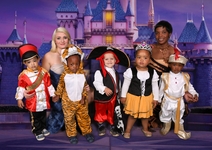QUESTIONS & ANSWERS ON THE MONTESSORI METHOD
WHAT IS IT?
It is a system of education in both a philosophy of child growth and a rationale for guiding such growth. It is based on the child's developmental needs for freedom within limits and on a carefully prepared environment that guarantees exposure to materials and experiences through which to develop intelligence as well as physical and psychological abilities. It is designed to take full advantage of the self—motivation and unique ability of young children to develop their own capabilities. Children need adults to expose them to the possibilities of their lives, but the children themselves must direct their responses to those possibilities.
Key premises of Montessori education are:
Children are to be respected as different from adults and as individuals who differ from each other. Children possess unusual sensitivity and mental powers for absorbing and learning from their environment that are unlike those of adults, both in quantity and capacity. The most important years of growth are the first six years of life, when unconscious learning is gradually brought to the conscious level. Children have a deep love and need of purposeful work. The child works, however, not as an adult for profit and completion of a job, but for the sake of the activity itself. It is this activity which accomplishes the most important goal for the child, the development of his or her mental, physical and psychological powers.
HOW DID IT BEGIN?
Dr Maria Montessori, the first woman to graduate from the University Of Rome Medical School, became interested in education as a doctor treating retarded children. After returning to the University for further study, she began her work with normal children in 1907, when she was invited to organize schools in the reconstructed slum area of San Lorenzo, Italy. Later, she travelled all over the world lecturing about her discoveries and founding schools. She has written approximately fifteen volumes and numerous articles on education. She died in 1952.
IS IT FOR ALL CHILDREN?
The Montessori system has been used successfully with children from age two-and-a-half, from all socio-economic levels, representing those in regular classes as well as the gifted, the retarded, the emotionally disturbed and the physically handicapped.
It is also appropriate for classes in which the student-teacher ratio is high, because the children learn at an early age to work independently.
IS THE CHILD FREE TO DO WHAT HE CHOOSES IN THE CLASSROOM?
The child is free to move about the classroom at will, to talk to other children, to work with any equipment he or she understands, or to ask the teacher to introduce new material to him or her. The child is not free to disturb other children at work or to abuse the equipment that is so important to the child’s development.
WHAT DOES THE TEACHER DO?
The teacher works with individual children, introducing materials and giving guidance where needed.
A primary task is careful observation of each child in order to determine his or her needs and to gain the knowledge needed in preparing the environment to aid each child's growth.
The method of teaching is indirect, in that it neither imposes upon the child as in direct teaching, nor abandons the child as in a non-directive permissive approach. Rather, the teacher is constantly alert to the direction in which the child has indicated he or she wishes to go, and actively works to help the child achieve his or her goals.
WHAT HAPPENS WHEN CHILDREN GO FROM A MONTESSORI CLASS TO A TRADITIONAL CLASS?
Most children appear to adjust readily to new classroom situations. In all likelihood this is because they have developed a high degree of self-discipline and independence in the Montessori environment, and because of the adaptability of young children in general.
HOW CAN PARENTS HELP THE CHILD AT HOME?
To give a child the best opportunity for development, the Montessori principles and philosophy should be implemented in the home from birth. Parents need to read books as well as attend workshops, lectures and courses if possible, on implementing the Montessori Philosophy in the home. If the home and school environments complement each other, the child will receive the maximum benefit.
-
Encourage a positive attitude to learning. If you have a positive attitude towards your child when he is trying to learn something he will be encouraged and in turn, will be positive too.
-
Help him develop memory skills. It is thought that there are several kinds of memory; some children are able to learn by rote more easily than others; some appear to have good visual memory; others appear to have good auditory memory: while yet others have a good memory for movement. Montessori devised several games to help visual and auditory memory.
They will give your child practice in these particular skills and it will be especially enjoyable for him as they are done in the context of games.
-
Encourage language development. Montessori wrote a great deal about the importance of language development during the first six years of life while he is in a sensitive period - and research since her time, has drawn attention to the relationship between language and learning; and language and thought. She was the forerunner of one important theory that maintains that the child is born with the natural capacity for language and communication because we, as human beings, possess inborn structures that enable us to make sense of the sounds and words we hear.
It isn't difficult to see why you should be aware of the importance of language development and its connection with intelligence. From early on - even before speech is developed communication between your baby and you is child driven. He likes to hear your voice, watch your face and focus on your eyes right from the moment of birth, and his response is to smile.
Yours is to talk more, so that he smiles more, and so the process continues. As a parent you will be called upon to play many roles in your child's life. First and foremost you must create a loving environment so that your child grows up forming intimate relationships within the family group. This gives a sound foundation and enables him to form meaningful relationships with others outside the family.



